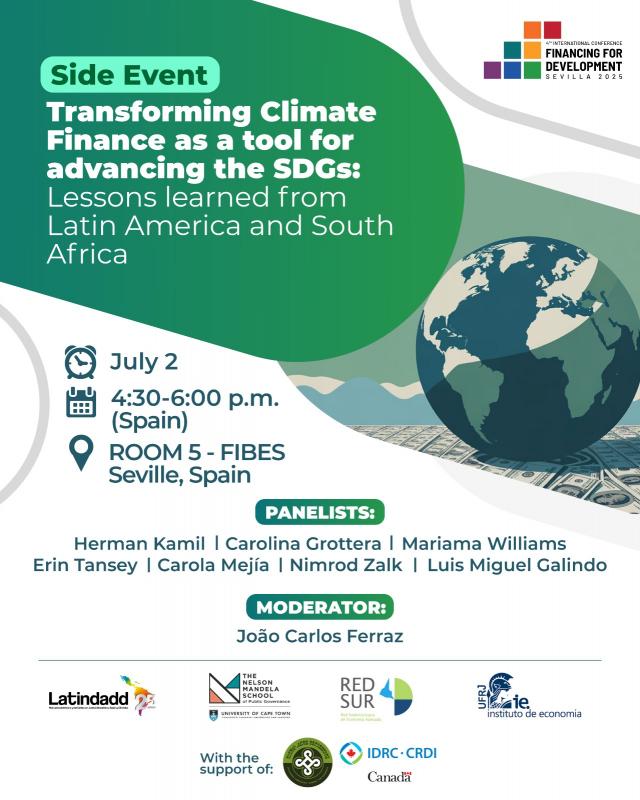- 02/07/2025
- Otros

On July 2, 2025, this side event within the 4th International Conference on Financing for Development (30 June - 3 July 2025), addressed climate change in line with the Paris Agreement to contribute to build a just, climate-resilient, and carbon-neutral global economy by mid-century. Climate finance is a cornerstone of this transition, ensuring both adaptation and deep decarbonization efforts are effective and inclusive.
Organizer and co-organizers: Latindadd, Red Sur, the Nelson Mandela School of Business and Instituto de Economia da Universidade Federal do Rio de Janeiro (IE-UFRJ), with the support of Canada’s International Development Research Center (IDRC) and of the Global Afro-descendant Climate Justice Collaborative (GADCJC).
Background: At the 4th Financing for Development (FfD) Conference, the international community will work toward adopting a joint outcome document to guide the future implementation of the FfD agenda. This document aims to strengthen policy coherence and alignment with the Paris Agreement, the Sustainable Development Goals (SDGs), and other internationally agreed development frameworks. For many developing countries, this means reaffirming the right to development and national policy space—as emphasized since Monterrey—while also advancing international reforms to address systemic challenges and structural disparities. Key priorities include scaling up domestic resource mobilization, catalyzing additional financing, and expanding the role of regional and national public development banks.
During preparatory sessions, several governments from the Global South emphasized that progress on the SDGs depends not only on domestic policy efforts but also on a more equitable international financial architecture and robust global public financing. Brazil has taken a leadership role in this space through the G20 and in the lead-up to COP30, notably with the launch of the COP30 Circle of Finance Ministers—an important initiative under Brazil’s COP30 presidency to support the development of the Baku to Belém Roadmap, aimed at mobilizing USD 1.3 trillion for climate action.
Addressing climate change in line with the Paris Agreement requires an unprecedented mobilization of resources to build a just, climate-resilient, and carbon-neutral global economy by mid-century. Climate finance is a cornerstone of this transition, ensuring both adaptation and deep decarbonization efforts are effective and inclusive. Without robust, inclusive, and consistent financing approaches, the credibility and feasibility of net-zero targets remain at risk. Furthermore, current climate finance mechanisms risk reinforcing existing inequalities. In a world grappling with multiple, overlapping crises, financing solutions must be systemic, integrated, and equitable.
This session will convene government representatives, experts, and researchers to share recent climate finance experiences and insights from Latin America and Africa. It will explore the key barriers hindering the scale-up of equitable climate finance, including gender-blind approaches, and examine how these issues intersect with all pillars of the FfD process and the broader COP30 agenda. The session will put forward actionable solutions to ensure that climate finance contributes meaningfully to gender equality, accelerates SDG implementation, and advances the goals of the Paris Agreement.
Proposed agenda
Part 1: Exploring opportunities for increased sovereign finance and climate finance innovations for a just transition (40´)
- Herman Kamil, Debt Management Unit, Ministry of Economy and Finance, Uruguay
- Carolina Grottera, Director of the Executive Secretariat of the Ministry of Finance, Brazil
- Mariama Williams, Senior Strategic Advisor, Global Afro-descendant Climate Justice Collaborative (GADCJC)
- Erin Tansey, Director of the Sustainable and Inclusive Economies division, International Development Research Centre (IDRC)
Part 2: Development banks, high-impact climate change mitigation and adaptation and green industrial policies (40’)
- Carola Mejía, Climate Justice, Transitions and Amazon Coordinator, LATINDADD
- Nimrod Zalk, Chief Research Officer, Climate and Development, Nelson Mandela School of Public Governance (NMSG), South Africa
- Luis Miguel Galindo, Professor, Universidad Nacional Autónoma de México (UNAM), Mexico
Moderation: João Carlos Ferraz, Brazil, South American Network on Applied Economics/Instituto de Economía, Universidade Federal de Rio de Janeiro (IE/UFRJ).
More information in the official UN Finance for Development website,
